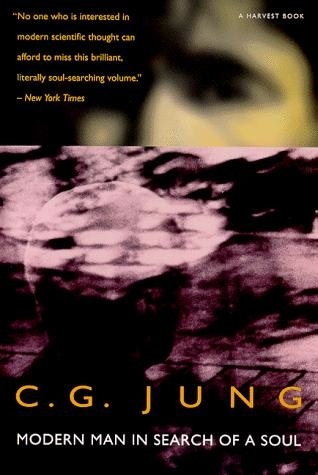










A very insightful and meaningful book, 11 intriguing essays in 244 pages. Jung is a deeper thinker, and I think not reductive like Freud and Adler tended to be. He makes no claim to dogmatism or absolutes. Jung really hits on the psyche and transcends the borders of rational intelligence into areas of the unconscious expressions in symbolism and images.
I am going to argue against another reviewer here that gave this book 4 stars as being outdated. When I look at the present collective societal structure and current cultural pattern apart from the minority of advanced individuals, I can see the postmodern man has regressed far from the modern man of the 1930's in search of a soul. Of course there as been advances individually, but on a collective level; fundamentalism, religious literalism, nationalism, patriotism and one-sided thinking This has grown in major proportions as opposed to the other way around and it is far more serious than most even realize and patterns after historical events of very similiar nature.
The first essay on dream-analysis hits on the idea that dreams are very hard to interpret and suggests that understanding the circumstances and conditions of the conscious life is significant in relation to the dreams of the unconscious life.
On the problems of psychotherapy, Jung relates four stages of analytical psychology, the confessional, explanation, education and transformation
"The great decisions of human life have as a rule far more to do with the instincts and other mysterious unconscious factors than with conscious will and well-meaning reasonableness. The shoe that fits one person pinches another; there is no recipe for living that suits all cases. Each of us carries his own life-form - an indeterminable form which cannot be superseded by any other." p. 61
The essay on the personality types is short, non-exhaustive and briefly relates Jung's ideas of the introvert, the extrovert and the 4 basic types consisting of those persons who are thinkers, feelers, sensory and intuitive.
In his essay on the stages of life, Jung ventures beyond childhood into early adulthood and the expansion of the self into sexual desires and masculine and feminine traits and how after somewhere in the 40's there begins a contraction of the self where men may acquire more feminine traits and women more masculine. In the second half of life less is needed to educate his conscious will but more aim towards the inner being, until old age where one leaves the rational self and retreats into the psyche as children yet in a different sense.
Jung acknowledges the validity of Freud and Adler and their valuable contributions, yet Jung sees Freud's sexual reduction to all neurosis as limiting, as well as Adler's will to power over inferiority as the sole cause. Both views have proven themselves as valid in many cases, yet Jung finds there is far much more levels in what he calls "value intensities," which underlie many complexes.
Jung also briefly goes into the archaic man's interpretation of all chance events having external meanings and causes, or as causal occurrences and the contrast of the modern man's ability to see the majority of chance and unexplainable events as the human imagination, as the perception of the human. Also the same ability of assumptions in the archaic man, can be seen in the modern who uses science as the foundation over the supernatural.
Jung's essay on psychology and literature is my favorite essay. It hits on something I both think of and am affected by almost every day. I found this entirely meaningful and very much profound. In this he writes of two types of writers; those that explain all they write of and those that have visions where their writing is obscure and needs the psychologist to read into. It is those visionaries that are the most inspiring. Here there exists those as in The Shepherd of Hermas, in Dante, in the second part of Faust, in Nietzsche's Dionysian exuberance, in Wagner's Nihelungenriing, in Spitteler's Olympischer Fruhling, in the poetry of William Blake, in the lpnerotomachia of the monk Francesco Colonna, and in Jacob Boehme's philosophic and poetic stammerings.
Jung speaks of the human intuition that points to things that are unknown and hidden, and by our very nature are secret and that throughout human history this unfathomable primordial source of creative experience been expressed in images, as in the sun-wheel, in attempting to point to this. The artist and poet will resort to mythology and images which only appear to occur in dreams, cases of insanity, narcotic states and eclipses of consciousness.
"A great work of art is like a dream; for all its apparent obviousness it does not explain itself and is never unequivocal. A dream never says; "you ought," or "this is the truth." It presents an image in much the same way as nature allows a plant to grow, and we must draw our own conclusions." p. 171
I really can't even begin to touch on all the vital, significant and soul inspiring information that is loaded in the pages of this book and I think as I try I am taking away from what's written far better than what I'll ever write. I recommend this book.

